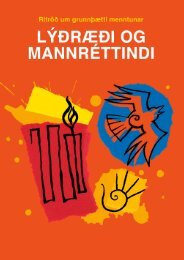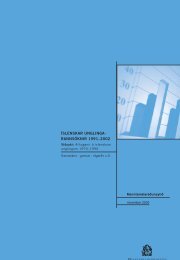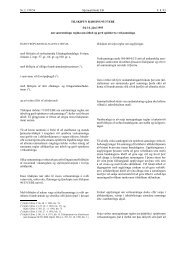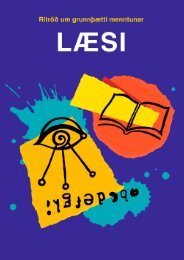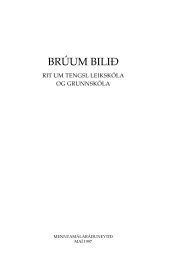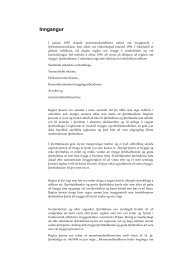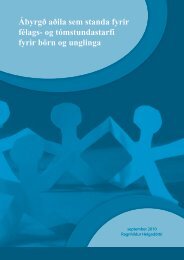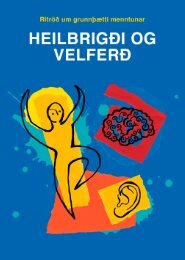Arts and Cultural Education in Iceland : Professor Anne Bamford
Arts and Cultural Education in Iceland : Professor Anne Bamford
Arts and Cultural Education in Iceland : Professor Anne Bamford
You also want an ePaper? Increase the reach of your titles
YUMPU automatically turns print PDFs into web optimized ePapers that Google loves.
Figure 3.8.3 Do parents have the option to evaluate the school (Dance)<br />
Similarly, parents <strong>in</strong> Music school were <strong>in</strong>volved <strong>in</strong> the evaluation process, as can be seen <strong>in</strong><br />
Figure 3.8.4.<br />
Figure 3.8.4 Do parents <strong>and</strong> students have the option to evaluate the music school?<br />
3.9 Ongo<strong>in</strong>g professional development<br />
‣ Beyond the specialised teachers, teacher confidence <strong>and</strong> expertise to teach arts<br />
<strong>and</strong> creative education is low, particularly <strong>in</strong> the compulsory school<br />
‣ Professional development opportunities can be expensive <strong>and</strong> short-term<br />
‣ Postgraduate education is not generally accessible to teachers that are <strong>in</strong> full-time<br />
employment, except through ‘sabbatical’ provisions<br />
‣ Onl<strong>in</strong>e education has provided professional development for more isolated<br />
teachers (especially preschool teachers) but is not considered to be a successful<br />
model for arts education<br />
‣ There are untra<strong>in</strong>ed teachers work<strong>in</strong>g <strong>in</strong> arts education<br />
‣ More connections are needed between the various providers of professional<br />
development<br />
‣ While the professional development of teachers is vital, the professional<br />
development of artists is also a key issue<br />
‣ Teacher education <strong>and</strong> research expertise <strong>in</strong> arts education needs to be developed<br />
‣ Professional development <strong>in</strong> the value of arts <strong>and</strong> cultural education is needed for<br />
school pr<strong>in</strong>cipals<br />
It was widely reported that there is a pattern of fall<strong>in</strong>g levels of confidence to teach the arts<br />
<strong>in</strong> Icel<strong>and</strong> <strong>and</strong> a lack of skill, experience <strong>and</strong> expertise. There appears to be reductions <strong>in</strong> teacher<br />
education <strong>in</strong> the arts <strong>and</strong> it is possible for a teacher to qualify without any tra<strong>in</strong><strong>in</strong>g <strong>in</strong> arts <strong>and</strong><br />
creative education. Similarly, specialist arts <strong>and</strong> music teachers may have expertise <strong>in</strong> their<br />
discipl<strong>in</strong>e field but very little if any education tra<strong>in</strong><strong>in</strong>g or <strong>in</strong>duction <strong>in</strong>to how children learn <strong>and</strong><br />
develop <strong>in</strong> the arts. In more isolated <strong>and</strong> difficult to staff areas there is a real shortage of<br />
qualified teachers especially <strong>in</strong> music <strong>and</strong> woodcraft. Internationally tra<strong>in</strong>ed teachers fill many of<br />
the gaps. These <strong>in</strong>ternational teachers tend to be of a high st<strong>and</strong>ard <strong>and</strong> appear to adapt<br />
effectively to the Icel<strong>and</strong>ic system.<br />
82



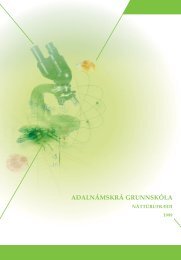
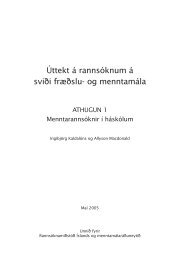
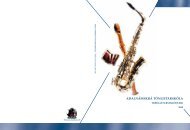
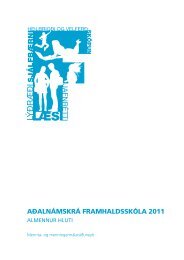
![Aðalnámskrá tónlistarskóla : rytmÃsk tónlist [Eingöngu á rafrænu formi]](https://img.yumpu.com/50843672/1/184x260/aaalnamskra-tanlistarskala-rytma-sk-tanlist-eingangu-a-rafranu-formi.jpg?quality=85)
